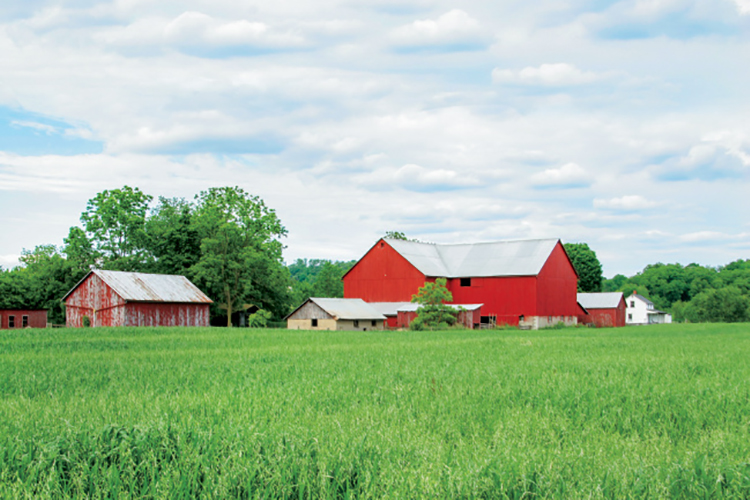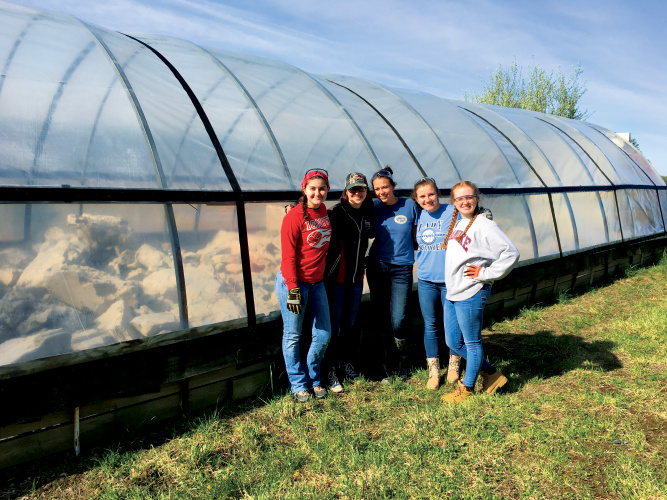Home > Ohio > Ohio Ag Education > Ag Education Program Gives Students a Taste of Ohio Farm Life
Ag Education Program Gives Students a Taste of Ohio Farm Life
In partnership with: Ohio Department of Agriculture

Hudson High School, (HHS), located in an affluent suburb between Cleveland and Akron, gives students the opportunity to step outside their comfort zones and learn more about the state they call home and the food they eat.
Along with completing classroom work, students in a Service Learning class spend several days volunteering at local agencies and organizations. Toward the end of the school year, they travel to Adams and Brown counties in southern Ohio for an Appalachian Service Project, where many students see what production agriculture is all about, often getting an up-close-and-personal look at farming for the first time.
Service Learning offered annually, the Service Learning class at HHS began in 1998 and is an elective course available to seniors. To enroll in the class, students must apply and undergo an interview process, with 90 students ultimately chosen to participate.
“We’re looking for students who want to be in the program for the right reasons,” says Marty Bach, who helped start the Service Learning class and serves as one of four teachers. “They want to broaden their horizons, or they’ve done service before and it’s a part of their life, and they want to continue serving.”
The class’ Appalachian Service Project began in 2004, and students spend three days at three different sites in southern Ohio in mid-April. While one site offers an educational experience, another gives students the opportunity for physical labor and the third helps students develop a greater understanding of poverty.
“The Appalachian Service Project gives students an overall rural experience,” Bach says. “It’s a win-win situation – the students get hands-on experience while helping others.”

Agricultural Education
Bach and his colleagues organize several opportunities with southern Ohio farmers, and students choose which destinations they’re most interested in.
HHS students visit sites like an alpaca farm, a cattle farm and a lavender farm, often with Future Farmers of American (FFA) students from high schools in the region. As a result, Bach says HHS students have even more opportunities to learn about a different way of life and make lasting connections.
Todd Raines with Raines Farms and Greenhouses, located in Adams County, hosts HHS students during their Appalachian Service Project. Raines, a fifth-generation farmer, says he has participated in the project since its inception, showing students what a large, diversified farm looks like with 1,500 acres of corn and soybeans, more than 100 acres of burley tobacco, a 400-head beef cattle operation and several greenhouses.
While at Raines Farms and Greenhouses, students often work in the greenhouses and spend time with the cattle, and Raines says he talks to them about the scientific approach that modern agriculture requires. For example, Raines usually explains how embryonic transfer in cattle is handled, and in the past students have had the opportunity to assist with cattle vaccinations and calf births.
“Most of us in agriculture do not do a very good job of educating the public about what we do and how we do it, and I think spending time with these students who are eager to learn and understand is a great way to get our message out,” Raines says. “I really enjoy hosting the students and teaching them about what we do here.”
Bach says the Appalachian Service Project has been a success since day one, and it’s common for students to leave with a much greater sense of what it means to work in production agriculture.
“Students often leave the agricultural sites with a much better understanding of where their food comes from,” Bach says. “They’re also amazed at how complex and technical farming is, and they walk away with a deep appreciation for the many different areas of expertise a farmer has.”



